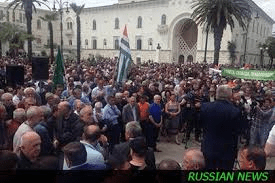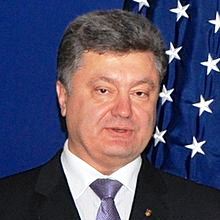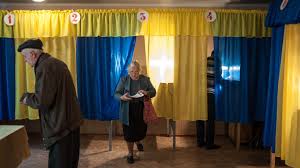A political crisis has been going on in Abkhazia for more than a month, unnoticed in the shadow of the Ukrainian events. When the crisis started, at the end of April 2014, four opposition parties, the Forum for Political Unity of Abkhazia, United Abkhazia, People’s Party, and the Party for Economic Development of Abkhazia, created a Coordination Counsel and appealed to Abkhaz President Alexander Ankvab for “constitutional reform for the re-distribution of power between the president and the prime minister and for establishment of an independent judiciary.”
The failure of negotiations led to protests that resulted in the opposition taking over the capital, Sukhumi, while Ankvab moved to the town of Gudauta, which is located next to a Russian military base. The parliament sided with the opposition and on May 29 they called for the president to resign and they appointed Valery Bganba, speaker of the parliament, as acting president. Under pressure, Ankvab stepped down on June 1 and new presidential elections are now set for August 24.
The crisis once more exposed the main problems in Abkhazia. Domestically, Abkhaz society and state function in the controversial post-Soviet logic of hybrid regimes, when the head of the state tries to concentrate power and build a “power vertical” (as has been the case in Russia) often in order to “stabilize society” while the political elite and society looks for the ways to develop different branches of power in order to avoid Soviet-style authoritarianism.
In foreign policy, the biggest Abkhazian challenge is to overcome International isolation after breaking away from Georgia, which happened back in 1992. Sooner or later, Abkhazia needs to settle its relations with Georgia, and the Ankvab administration actually took that step by issuing Abkhazian passports to the “Georgian” population in the Galsky district of Abkhazia. However, even this legitimate and limited step undermined Ankvab’s popularity, especially among the influential group of 1992-93 Georgian-Abkhaz war veterans. It gave the opposition the opportunity to accuse Ankvab of short-comings: that he only did it in order to increase his electorate for the next re-elections (selfish reasons) and to let Georgia take over Abkhazia (pro-Georgian).
The problem is that Abkhazia remains an ethnocratic state with Abkhazians being about 50 percent of the country’s population of 250,000, making Abkhazians fear that allowing the return of 250,000 internally displaced Abkhazian Georgians would affect the fragile demographic balance. Another concern is that the return of the refugees would lead to the redistribution of property that had belonged to the Abkhaz Georgians before they left the country. Ankvab’s administration initiated laws that would allow investors from Russia to buy property in Abkhazia, in that way trying both to attract Russian investment into the Abkhaz economy and to use Russia as a protector from the legal demands of internally displaced Abkhaz Georgians. However, all these initiatives raised fears, with one of the main ones being that it would further enhance the already heavy Russian influence in the Abkhaz economy.
In 2004, a candidate from the opposition, Sergei Bagapsh, won the presidential election by criticizing the stagnation of Abkhazia and calling for change. Now the sides have reversed and Bagapsh’s successor, the recently de-throned Ankvab, has stepped down under similar accusations from opposition parties, the ones that had lost power in 2004.
The political reality is that none of Abkhazia’s strategic problems have been resolved. It has been more than two decades that post-Soviet Abkhazia has been in economic crisis and international isolation. Whoever wins the upcoming presidential elections will find himself dealing with a society that wants to move on but cannot, and so the vicious circle continues. But on the other hand, it is fairly healthy not to have a single, entrenched power vertical.











